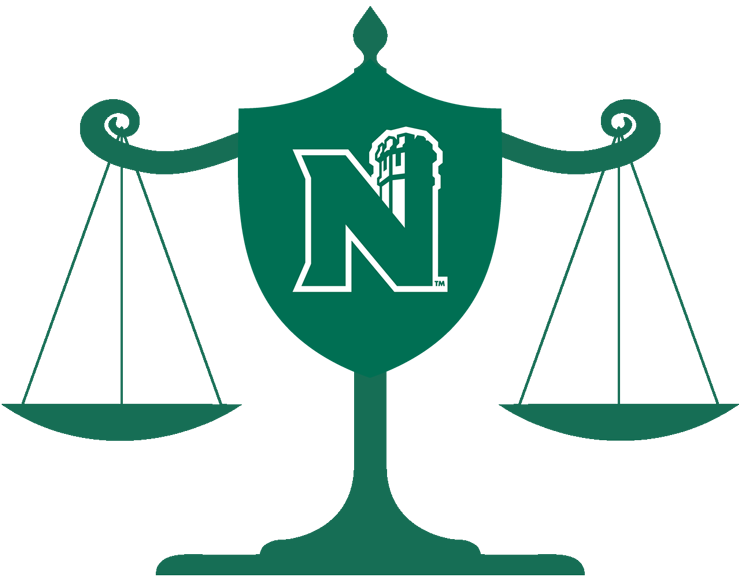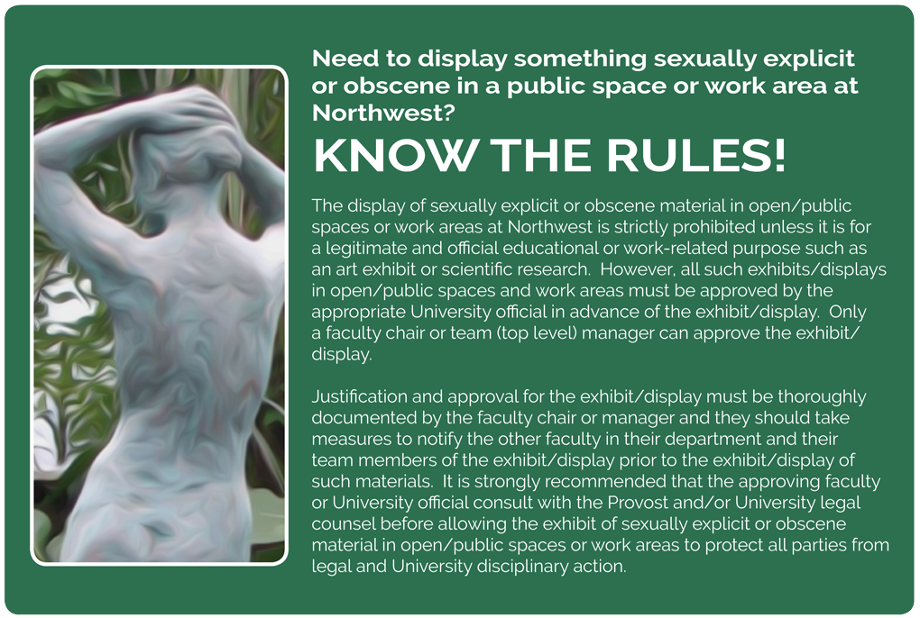Northwest is committed to ensuring efficient management and security of all campus technology resources to ensure the University's strategic goals for student success. All individuals using Northwest-provided technology resources and accounts are required to support and abide by campus technology policies.
Cybercrime is a worldwide problem and it affects students, faculty and staff on University campuses across the globe. Northwest is dedicated to preventing and mitigating security risks through outreach, awareness, assessment, policy and best practices.
An important part of the solution is for you, the user, to be alert for fraud and adopt good online habits such as changing your password when you are concerned it may have been compromised, deleting posts with too much sensitive information and keeping your anti-virus software current.
Northwest IT resources, including bandwidth and IP addresses,belong to the University. These resources do not belong to end users. Anyone using Northwest's wired or wireless networks are required to follow Northwest Technology Policies, as well as the acceptable use policy of the Missouri Research and Education Network (MOREnet), Northwest’s Internet service provider (ISP).
Disclaimer: Although the local, state and federal criminal statutes and legal consequences (e.g. fines, jail time, etc.) found within Northwest's technology policies sections have been produced and processed from legitimate government and pertinent legal/educational sources believed to be reliable, no warranty expressed or implied is made by Northwest regarding completeness or precision of the content.
Back to Northwest's Technology & Security Policies > Main Page


MISSOURI LEGAL STATUTES & POTENTIAL PENALTIES

|
|
|
|
|
|
| CHAPTER 565 |
|
| CHAPTER 569 |
|
| CHAPTER 570 |
|
| CHAPTER 573 |
|
As a member of our Bearcat family, you are expected to respect and abide by all University-approved policies, procedures and codes of conduct, as well as local, state and federal law.
NORTHWEST CONDUCT VIOLATIONS ARE ACTIONABLE
Things you should not do at Northwest:

Certain types of non-Univeristy, personally-owned hardware, software & programs are prohibited on campus and from connecting to the Northwest wired and wireless networks. The Office of Information Technology will actively monitor for the use of these types of hardware and software activity.
If activities involving prohibited hardware and software are detected or prohibited hardware and software is discovered, Information Technology staff (whenever reasonably possible) will:
If non-University, personally-owned hardware or software is negatively affecting either the campus wired or wireless network, it will result in:
| DHCP & NAT Equipment | Could duplicate services and make a user utilize a router under a hacker's control. Could also be used to steal an IP address from an organization for its own use. An IP is similar to a social security number in that it is a unique numerical label assigned to each device connected to a network. |
|
DNS & DDNS Equipment |
Could be used to launch a distributed denial of service attack to disable a University server and then take over that service so that users are directed to bogus web sites that are owned by the attacker. |
| Network/Port Scanners & Packet Sniffers | Could be used to probe network equipment or listen, read, capture or "sniff" network traffic. In short, could be used to view and capture communications on a wireless or wired network and compromise privacy and security. |
| Setting or Resetting Traffic Priority | Could expose a network to multiple security risks such as a denial of service attack. A hacker could obtain information such as what network adapters are available during a client logon sequence or move information offsite. |
| Modifying or Changing Physical MAC addresses | Could be used to impersonate another user in the domain or present themselves as a duplicate MAC on the same LAN, which would cause service problems for the user being duplicated. A hacker could also transmit rules and Ethernet frames to that address, which would cause errors for everyone on the network. |
| Internet Connection Sharing | Could allow computers to be infected by malware or allow a hacker to directly access your computer and look at your data. |
| Non-approved Operating Systems | Could cause spontaneous shutdowns and loss of data, as well as, allow computers on the network to be infected by malware. |
| Network or Cable/DSL routers | Could be taken over for criminal activities such as illegal downloads and attacks on web sites and used in distributed denial of service attacks. Could allow a hacker access to information on the network and to your personal data such as usernames, passwords, credit card details, email and more flowing through an encrypted Wi-Fi network. |
|
Servers not Operated or Approved by Northwest's Office of Information Technology |
A server is defined as any machine or device connecting to the Northwest wired or wireless networks that provides files or services or sends more data than it receives. Providing online services to users via the campus network or turning your computer into a server to provide files to other users on the campus network could create network multiple security risks like invasion of privacy and subject you to legal charges including, but not limited to, copyright infringement. Types of prohibited servers: Domain, HTTP, FTP, IRC, MP3, VPN, music or video servers and open file servers or shares. |
| Assigning a Static IP Address | If a hacker knows you and your IP, then he can gain enough information to slowly penetrate into your network from offsite and compromise your password among other security issues. |
| Devices to Extend Northwest Network Services | Non-University-approved wireless LAN devices can disrupt and slow down network services to other users on the campus wireless network. |
| Tunneling Software | Could allow a hacker to access or provide a network service that the network does not support or to obtain access to data across the network by bypassing firewall protection. |
| Peer-to-Peer File Sharing | Viruses are the biggest security risks, because peer-to-peer file sharing enables files to be transferred among multiple computers, many of which may be infected with files carrying worms and malware. Other issues include online attacks and self-help attacks that could target a computer's IP Address and allow access to your computer by a hacker. |
| Any software or hardware that circumvents or bypasses campus network management tools such as a firewall is prohibited. All equipment that the Office of Information Technology determines interferes with the normal operations of the campus wired or wireless network and its servers is prohibited. |
|
|
||